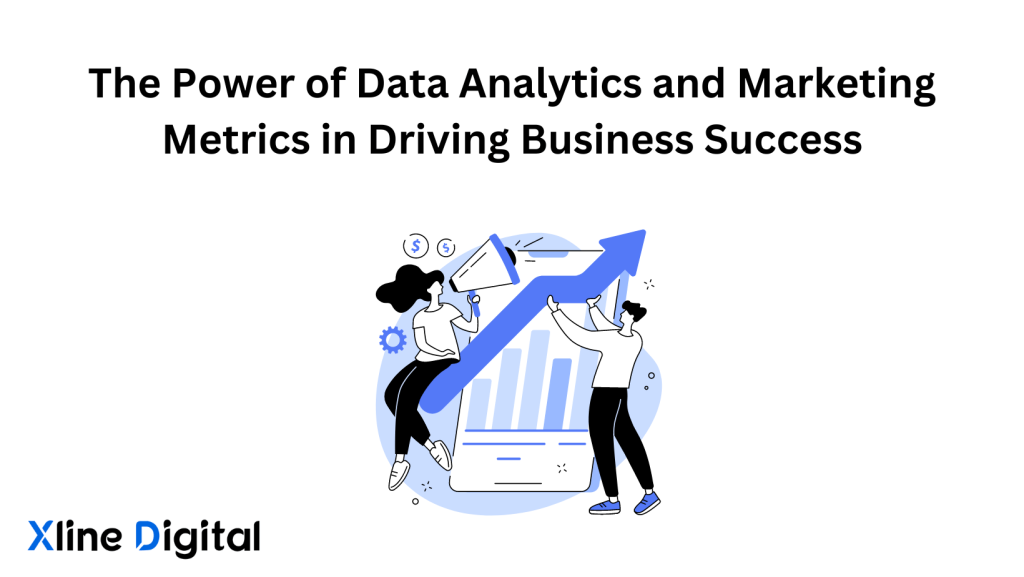Introduction:
In the fast-paced world of digital marketing, data has become the driving force behind strategic decision-making. Data analytics and marketing metrics play a pivotal role in shaping successful marketing campaigns, optimizing customer experiences, and ultimately, achieving business objectives. In this article, we will delve into the significance of data analytics and marketing metrics, their impact on modern marketing strategies, and how to harness their potential for maximum business growth.
Understanding Data Analytics in Marketing
In the dynamic world of marketing, understanding and harnessing the potential of data analytics is crucial for driving successful campaigns and achieving business objectives. Data analytics in marketing involves the systematic collection, analysis, and interpretation of vast amounts of data to extract valuable insights and patterns about consumer behavior, preferences, and interactions. By leveraging data analytics, marketers can make informed decisions, optimize their strategies, and create more personalized and effective marketing campaigns.
The Role of Data Analytics:
Data analytics provides marketers with a deeper understanding of their target audience and helps identify trends and opportunities that might have otherwise remained unnoticed. By employing advanced data analysis techniques, businesses can transform raw data into meaningful information, which, in turn, enables them to make well-informed decisions based on evidence rather than guesswork.
Types of Marketing Data:
In the realm of marketing, various types of data are collected, including:
- Demographic Data: Information about customers’ age, gender, location, and other demographics provides valuable insights into the target audience’s characteristics.
- Behavioral Data: This data reveals how consumers interact with a brand, website, or app. It includes browsing patterns, purchase history, and engagement metrics.
- Psychographic Data: Psychographic data delves into customers’ personalities, values, interests, and lifestyles, helping marketers tailor their campaigns to resonate with specific customer segments.
- Social Media Data: Social media platforms generate a wealth of data about customers’ preferences and sentiments, enabling businesses to create more relevant and engaging content.
Benefits of Data Analytics in Marketing:
Data analytics offers several benefits that are instrumental in driving marketing success:
- Improved Targeting: By understanding customer preferences and behaviors, businesses can segment their audience more effectively and target specific groups with personalized messaging.
- Optimized Content Strategy: Analyzing data on content performance helps identify which types of content resonate most with the target audience, allowing marketers to fine-tune their content strategy.
- Enhanced Customer Experience: Personalization, based on data insights, enables brands to create tailored experiences that foster customer loyalty and satisfaction.
- Better Resource Allocation: Data-driven marketing decisions ensure that resources, such as advertising budgets, are allocated to the most effective channels and campaigns.
Data Privacy and Security:
While data analytics offers immense opportunities, it is essential to prioritize data privacy and security. Businesses must adhere to relevant data protection regulations and employ robust security measures to safeguard sensitive customer information.
Conclusion:
Data analytics has revolutionized the way marketing strategies are designed and executed. By leveraging the power of data, businesses can gain a competitive edge, deliver more personalized experiences, and drive remarkable results. Understanding data analytics in marketing is not merely a choice but a necessity for businesses looking to thrive in the digital age. As the technology continues to evolve, marketers must continuously adapt their strategies to remain at the forefront of the ever-changing landscape.
The Key Role of Marketing Metrics
In the fast-paced and highly competitive world of marketing, tracking and analyzing key marketing metrics play a pivotal role in measuring the effectiveness of marketing campaigns and overall business performance. Marketing metrics are quantifiable data points that provide valuable insights into various aspects of a marketing strategy. These metrics are essential tools that enable marketers to make data-driven decisions, identify areas for improvement, and optimize their marketing efforts for maximum impact.
Importance of Marketing Metrics:
Marketing metrics serve as performance indicators, guiding marketers in assessing the success and impact of their marketing initiatives. By monitoring and analyzing these metrics, businesses can gain a clear understanding of how their marketing strategies are performing and whether they align with their broader business goals.
Types of Marketing Metrics:
- Conversion Rate: The conversion rate measures the percentage of website visitors who take a desired action, such as making a purchase, filling out a form, or subscribing to a newsletter. A higher conversion rate indicates that the marketing campaign is effectively driving desired actions.
- Click-Through Rate (CTR): CTR is the percentage of people who click on a specific link, advertisement, or call-to-action after viewing it. A high CTR suggests that the content or advertisement is compelling and resonates with the target audience.
- Customer Acquisition Cost (CAC): CAC calculates the cost of acquiring a new customer. It helps businesses understand how much they need to invest in marketing and sales efforts to gain a new customer.
- Customer Lifetime Value (CLV): CLV estimates the total value a customer is expected to bring to the business throughout their entire relationship. Understanding CLV is crucial for effective customer retention strategies.
- Return on Investment (ROI): ROI measures the profitability of a marketing campaign by comparing the revenue generated from the campaign to the cost of running it. Positive ROI indicates that the campaign is profitable.
- Bounce Rate: Bounce rate represents the percentage of visitors who leave a website after viewing only one page. A high bounce rate may indicate that the website content or user experience needs improvement.
Setting and Tracking Marketing Goals:
Marketing metrics serve as benchmarks for setting and tracking marketing goals. By establishing clear and specific objectives, marketers can align their efforts with broader business goals, measure progress, and identify any gaps in performance.
Optimizing Marketing Strategies:
Marketing metrics provide valuable insights into which strategies and tactics are delivering the best results. Armed with this information, marketers can optimize their campaigns by allocating resources to the most effective channels, focusing on high-performing content, and refining targeting efforts.
Data-Driven Decision Making:
The availability of marketing metrics allows marketers to make informed decisions based on data rather than intuition or assumptions. This data-driven approach enhances the efficiency and effectiveness of marketing strategies.
Conclusion:
Marketing metrics are indispensable tools for modern marketers. They offer valuable insights into the performance of marketing campaigns and provide a roadmap for continuous improvement. By leveraging marketing metrics effectively, businesses can adapt their strategies, optimize their resources, and ultimately achieve greater success in reaching their target audience, driving conversions, and attaining their business objectives. Regularly tracking and analyzing marketing metrics are vital steps toward staying ahead in today’s competitive market and creating meaningful connections with customers.
Harnessing Data-Driven Marketing Decisions
In the fast-paced and data-rich landscape of modern marketing, harnessing the power of data-driven marketing decisions is essential for businesses aiming to stay ahead of the competition and achieve optimal results. Data-driven marketing involves using data and analytics to guide every aspect of marketing strategy, from identifying target audiences to crafting personalized campaigns and measuring performance. By embracing a data-driven approach, businesses can make informed decisions based on evidence rather than guesswork, leading to more effective and efficient marketing efforts.
Identifying Target Audiences:
Data-driven marketing begins with a deep understanding of the target audience. By analyzing demographic, behavioral, and psychographic data, businesses can create detailed customer personas. These personas help marketers tailor their messages to resonate with specific customer segments, resulting in higher engagement and conversions.
Personalization and Customer Segmentation:
Data-driven marketing enables personalized experiences for customers. By utilizing data insights, businesses can deliver highly relevant content, product recommendations, and offers, making customers feel valued and understood. Personalization not only improves customer satisfaction but also boosts customer retention and loyalty.
Optimizing Content and Messaging:
Data analytics provides invaluable feedback on content performance. By tracking metrics like engagement rates, time spent on pages, and click-through rates, marketers can identify which content resonates most with their audience. Armed with this information, they can optimize their content strategy to create more compelling and engaging materials.
Choosing the Right Channels:
Data-driven marketing helps businesses identify the most effective marketing channels for reaching their target audience. By analyzing customer behavior and preferences, marketers can invest their resources in the channels that yield the highest return on investment. This strategic allocation of resources ensures maximum impact for every marketing dollar spent.
A/B Testing and Experimentation:
Data-driven marketing facilitates A/B testing and experimentation. By comparing different versions of marketing assets, such as email subject lines, ad creatives, or landing page designs, marketers can identify the most effective variations. This iterative approach allows businesses to continuously improve their marketing efforts.
Optimizing Customer Journey:
Data analytics allows businesses to understand the customer journey better. By tracking interactions across various touchpoints, marketers can identify pain points and areas for improvement. This holistic view of the customer journey helps in designing a seamless and satisfying customer experience.
Measuring and Analyzing Performance:
Data-driven marketing ensures that every marketing campaign is measurable. By tracking key performance indicators (KPIs) such as conversion rates, customer acquisition costs, and ROI, businesses can assess the success of their marketing initiatives. Regular performance analysis helps marketers identify areas that need adjustment and reallocate resources for maximum impact.
Staying Agile and Adapting:
In a rapidly evolving marketing landscape, staying agile is vital. Data-driven marketing empowers businesses to quickly adapt to changing market trends and consumer behavior. With real-time data insights, marketers can make timely adjustments to their strategies, enabling them to remain competitive and relevant.
Conclusion:
Data-driven marketing decisions have become the cornerstone of successful marketing strategies. By harnessing the power of data analytics, businesses can gain a deeper understanding of their customers, create personalized experiences, optimize their campaigns, and measure performance effectively. The ability to make data-driven decisions enables marketers to stay agile and responsive in a dynamic market, fostering long-term customer relationships and driving business growth. Embracing data-driven marketing is not just a trend; it is a fundamental necessity for any business seeking to thrive in the digital era.

Follow Us – Facebook



